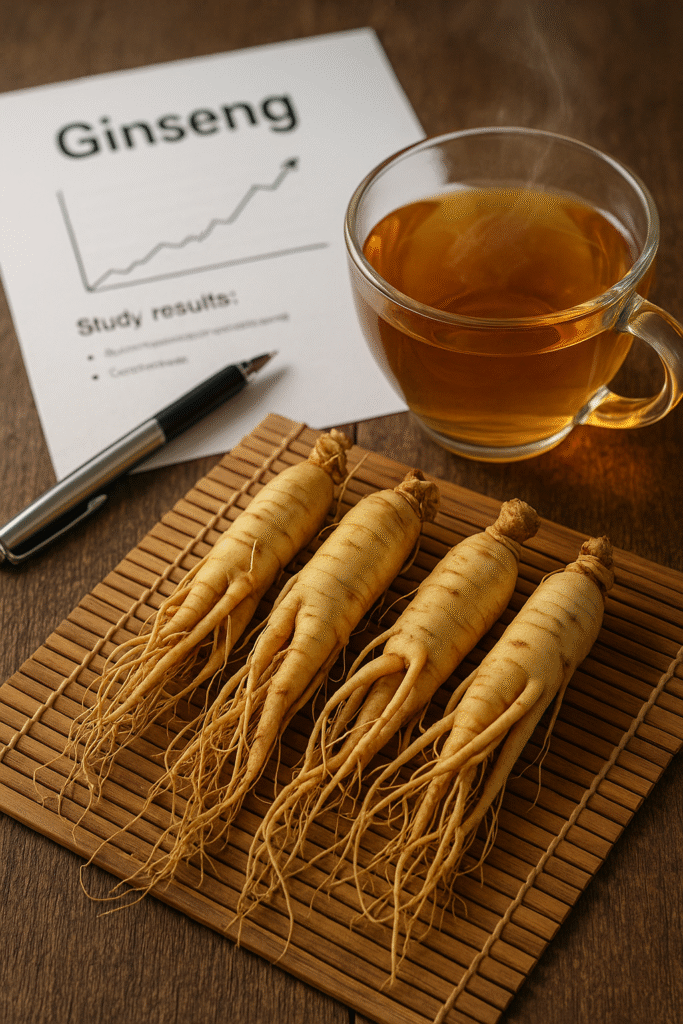Ginseng (Panax ginseng) is back in the spotlight in 2025. Several peer-reviewed studies and research roundups this year point to meaningful—though still evolving—evidence for glycemic control in prediabetes, fatigue relief after COVID-19, vascular function, and stress/cognition. Below, we break down what changed in 2025, what remains uncertain, and how shoppers can choose the right product and dose.
Quick highlights (2025)
- Prediabetes: A 12-week randomized, double-blind, placebo-controlled trial in Korea found that red ginseng extract powder (500 mg twice daily) improved fasting glucose, OGTT, and HbA1c vs. placebo and showed a time-dependent reduction in DPP-4 with no treatment-related adverse events. News-Medical
- Long COVID: A randomized, double-blind, placebo-controlled trial (J Ginseng Res, Epub Apr 24, 2025; in print July 2025) reported symptom relief—especially fatigue—in women, alongside immune-profile shifts after G1899 Korean red ginseng for 12 weeks. PubMed
- Vascular health: A 2025 systematic review & meta-analysis of clinical trials found ginseng supplementation increased flow-mediated dilation (FMD) and endothelium-derived nitric oxide (eNO) and reduced pulse wave velocity (PWV), with mixed results for augmentation index (AIx). BioMed Central
- Stress & cognition: A 2025 RCT (Nutrients) using hydroponically grown red ginseng (200 mg/day, 3 weeks) in 149 moderately stressed adults showed larger decreases in perceived stress and faster cognitive task responses vs. placebo. PubMed
- Liver & metabolic research: A 2025 Frontiers meta-analysis across animal studies suggests ginsenosides may improve lipids, transaminases, inflammatory markers in NAFLD models—promising but preclinical; clinical trials are still needed. Frontiers
- Important context: Major medical bodies continue to note that evidence for blood-sugar control in established diabetes is inconclusive, so claims should be conservative. NCCIH
Deep dive: What’s new and what it means
1) Blood sugar & prediabetes: clearer signals, still not a diabetes cure
The Korean RCT published Feb 23, 2025 (coverage) tested red ginseng extract powder (KGC05pg) at 500 mg BID for 12 weeks in 98 prediabetic adults. Results: significant improvements in fasting glucose, HbA1c, and OGTT time points (30–120 min), plus lower DPP-4 over time—mechanistically relevant because DPP-4 degrades GLP-1. Safety profile was clean. This strengthens the case for prediabetes management but doesn’t prove treatment for type 2 diabetes. News-Medical
What shoppers can do: If your goal is early metabolic support, look for standardized red ginseng extracts used in human trials and match dose & duration (e.g., ~500 mg twice daily for ~12 weeks). Combine with diet/sleep/activity changes for compounding benefits. (Medical advice disclaimer applies.)
2) Long COVID fatigue & immune balance: emerging human data
The G1899 red ginseng RCT (J Ginseng Res, in print July 2025) randomized ~220 recently infected adults; 108 vs. 108 completed. Women in the ginseng arm reported greater fatigue relief. Immune readouts showed rising CD4/CD8 ratio and prevention of Treg depletion vs. placebo—suggesting an immunomodulatory role worth further study. PubMed
What shoppers can do: For post-viral fatigue management, consider trial-like regimens and products with transparent ginsenoside content. Track personal outcomes (fatigue scales, activity logs) over 8–12 weeks, and consult clinicians, especially if you have comorbidities or take medications.
3) Heart & vessels: improved endothelial function (but nuances remain)
A 2025 meta-analysis pooling 13 RCTs found ginseng improved FMD and eNO and reduced PWV, consistent with better endothelial function; AIx findings were mixed and sensitive to subgroup/heterogeneity. Mechanistically, ginsenosides (e.g., Rg1/Rg3/Rb1/Re) may stimulate eNOS → eNO and possibly inhibit ACE, facilitating vasodilation. BioMed Central
What shoppers can do: Products standardized to known ginsenosides and documented assays are more predictable. If blood pressure or cardiovascular risk is a concern, coordinate with your physician and don’t stop prescribed meds.
4) Stress, mood & cognition: short-cycle benefits
A multicenter Belgian RCT (Nutrients, Mar 9, 2025) using hydroponic red ginseng (high in rare ginsenosides) found lower perceived stress, reduced negative affect, and faster spatial-planning responses after 3 weeks vs. placebo. Rapid “feelable” changes like stress and mental energy are exactly where adaptogens tend to show first signals. PubMed
5) Liver metabolism (NAFLD): strong preclinical signal—human trials needed
A Frontiers 2025 meta-analysis across 30 animal studies (n=604) reported multi-marker improvements (TG, TC, ALT/AST, IL-6, TNF-α, etc.) with ginsenosides, but authors stress bioavailability challenges and publication bias, underscoring the need for well-designed human trials. Frontiers
Buyer’s guide (2025 edition)
1) Standardization matters. Choose brands that publish ginsenoside assays (e.g., total %, with Rg1/Rb1/Rg3 breakdown). Clinical trials above disclose dose/duration—mirror those when possible. News-Medical+1
2) Pick your form by goal.
- Metabolic/vascular support: standardized red ginseng extracts used in RCTs. News-Medical+1
- Stress & cognition: extracts or rare-ginsenoside–enriched powders (short cycles of 3–8 weeks). PubMed
3) Check transparency. Look for batch numbers, COAs, and heavy-metal/microbe testing—especially if you buy roots or powders.
4) Dose & duration (typical from trials):
- Red ginseng extract: ~500 mg twice daily x 12 weeks (prediabetes study). News-Medical
- Hydroponic root powder (rare-ginsenosides): 200 mg/day x 3 weeks (stress RCT). PubMed
Always respect label directions and consult your clinician.
5) Safety & expectations. While recent prediabetes and vascular results are encouraging, evidence in established diabetes remains mixed; use ginseng as adjunct, not a substitute for medical care. NCCIH
FAQ
Q1. Is red ginseng “better” than white ginseng?
Different processes (steaming/drying for red) yield different ginsenoside profiles; some endpoints show benefits with red ginseng extracts in 2025 trials, but product quality and standardization are bigger drivers than color alone. News-Medical
Q2. How quickly will I feel effects?
Stress/mood endpoints have shown changes in 3 weeks; metabolic/vascular endpoints often need 8–12 weeks. PubMed+2News-Medical+2
Q3. Is it safe with my meds?
Generally well-tolerated in the cited trials, b
ut ginseng can interact with anticoagulants, hypoglycemics, and others. Coordinate with your healthcare provider. News-Medical
🇰🇷 Premium Korean Ginseng Online Shop







